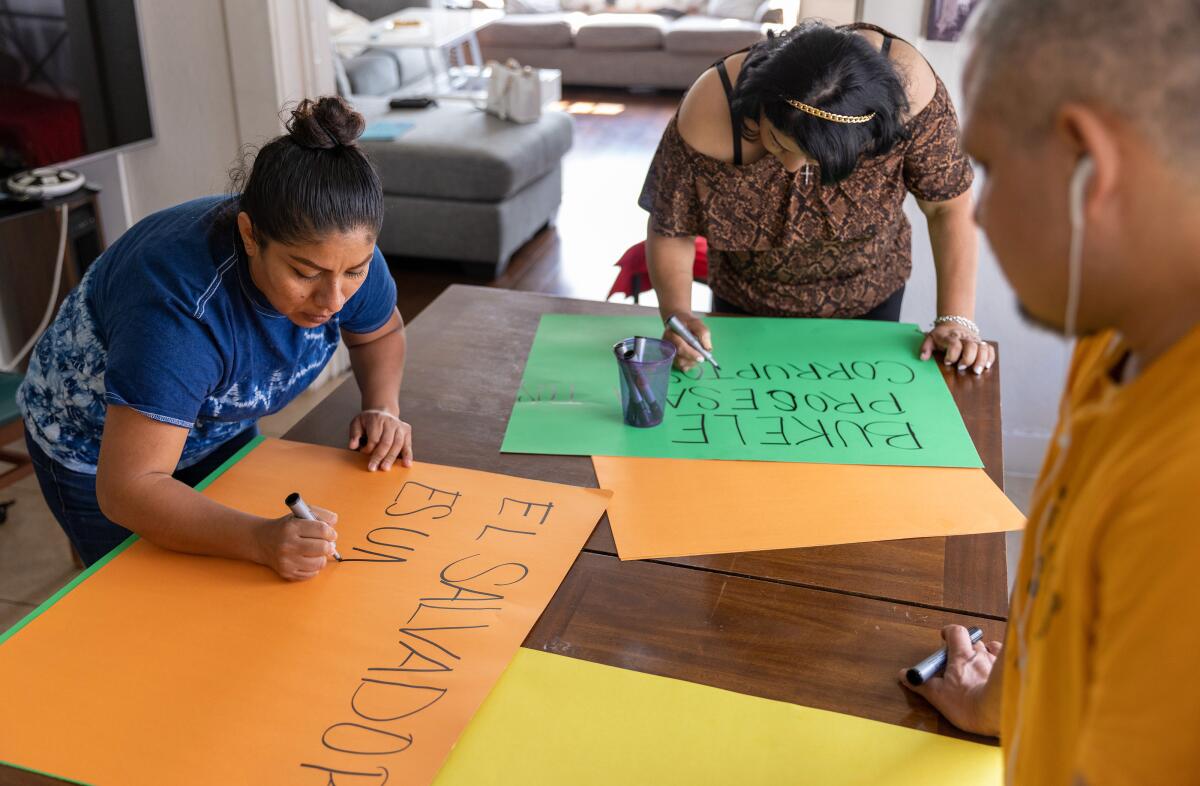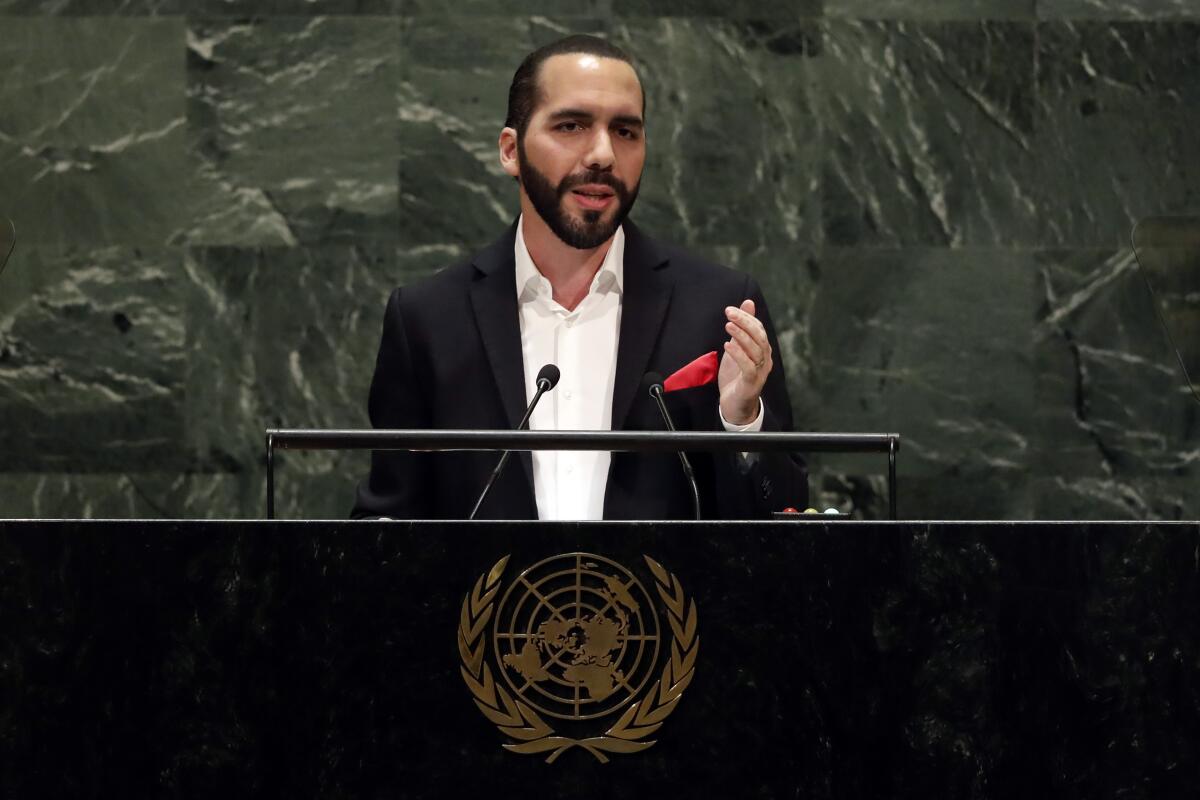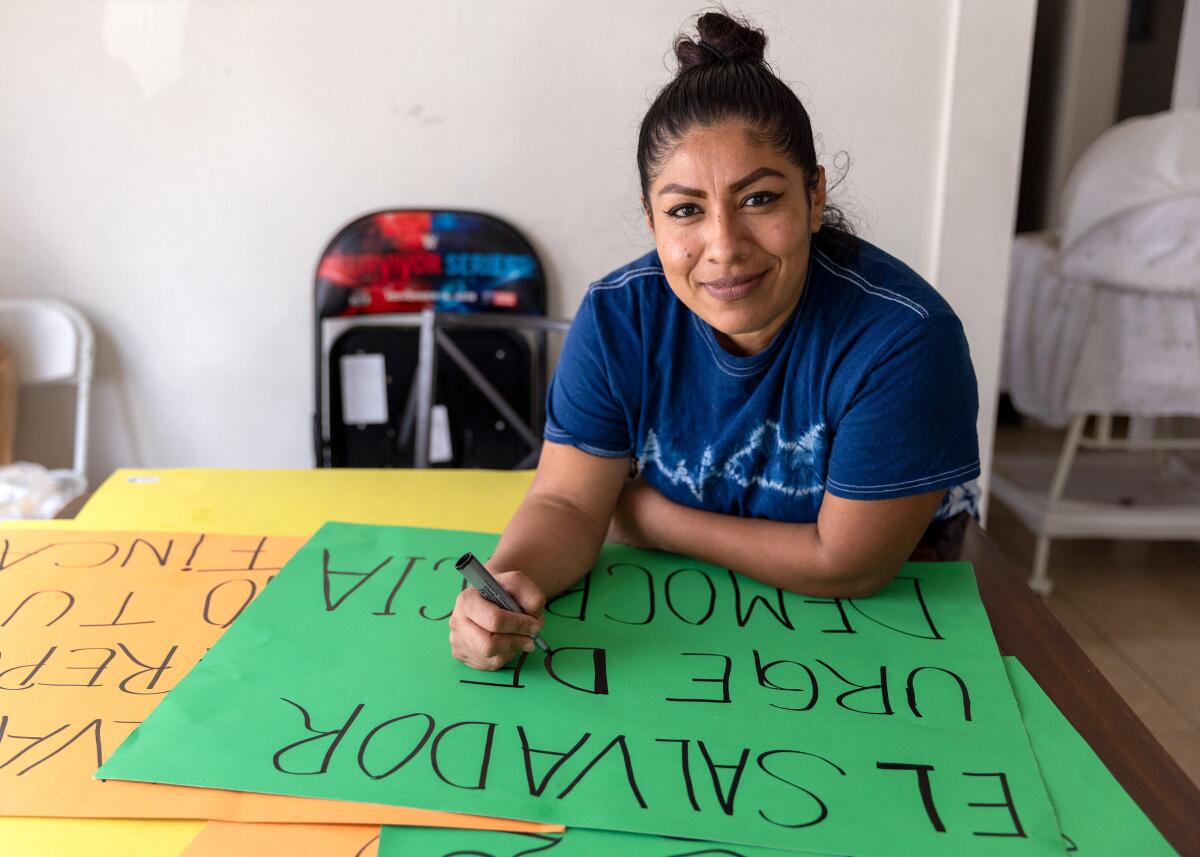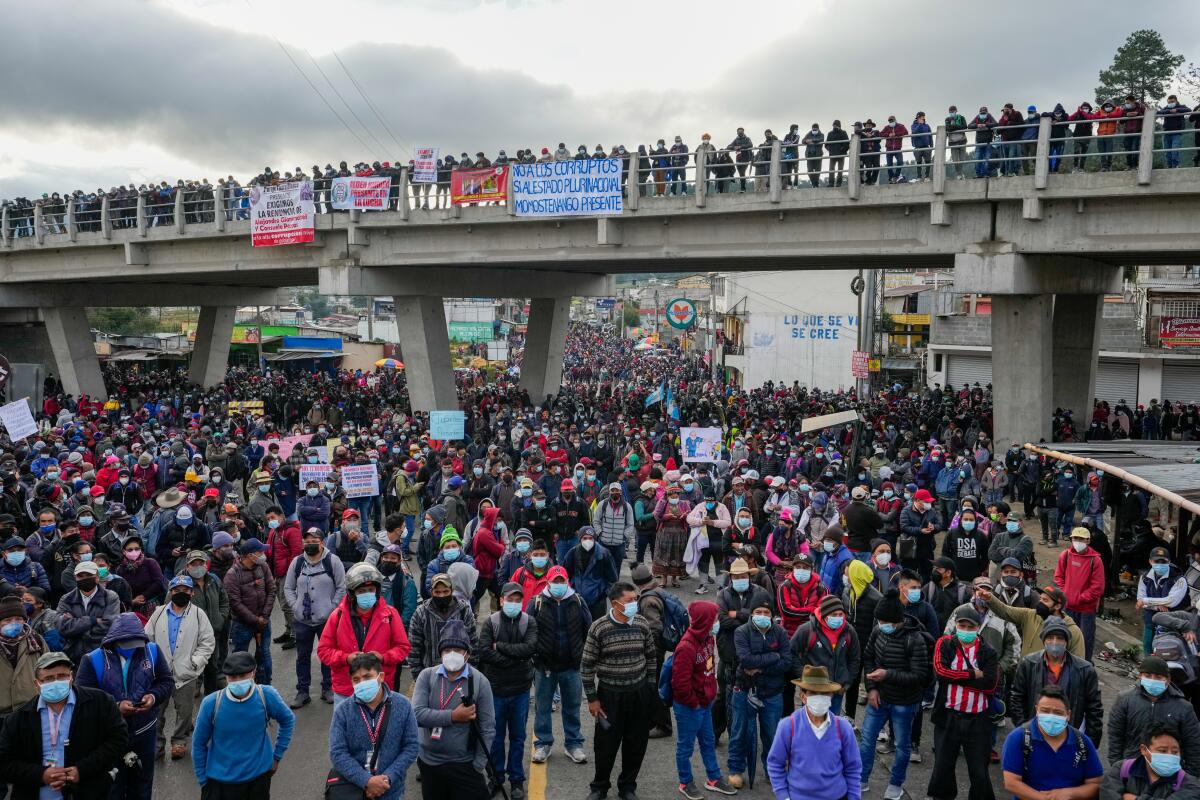Latin American immigrants will raise protests at Summit of the Americas in L.A.

- Share via
A few days before the Summit of the Americas was set to open in Los Angeles, Martha Peinado grabbed some poster sheets and fistfuls of marking pens to send an enthusiastically unwelcoming message to the president of El Salvador, Nayib Bukele.
Peinado, 38, who immigrated to California from her native El Salvador in 2015, and two fellow activists whipped up a dozen posters that they plan to brandish next week at the L.A. Convention Center, which will host the five-day gathering of hemispheric leaders beginning Monday.
“Nayib Bukele, US justice awaits you,” forewarned one greeting in black ink on orange poster sheets.
Peinado, originally from the Salvadoran province of La Libertad, was a member of the New Ideas party that brought Bukele to power riding a populist tide of disgust with El Salvador’s two-party status quo. But in the three years that Bukele has ruled the Central American nation, Peinado said, democracy has withered while corruption and insecurity have festered, partially as a result of the government’s secretive negotiations with gang leaders.
“We are going to protest because what was promised has not been fulfilled,” said Peinado, who immigrated to California in 2015 and runs a Mid-City cleaning business. “We want to show that what the president says, that the country is safer, is not true, and show that behind him there is great corruption.”
For the first time since its inaugural session in 1994, the summit will take place in the hemisphere’s richest, most powerful nation. But much has changed in the nearly three decades since those days in Miami. Boosterism over the 1994 North American Free Trade Agreement, known as NAFTA, has all but disappeared on both sides of the Rio Grande. China, pushing its aggressive Belt and Road initiative, is threatening U.S. hegemony in Latin America dating from the Monroe Doctrine. Then-President Trump skipped the summit’s previous session, in 2018 in Lima, Peru, sending Vice President Mike Pence in his stead.
As of Wednesday, the Biden administration had yet to confirm the official guest list, and it wasn’t clear whether Bukele would attend or join the heads of Cuba, Venezuela, Nicaragua and other countries that are either uninvited by the U.S. or are boycotting the event. But whichever countries show up in Southern California may find themselves at the center of bitter political battles they thought they’d left back home.

Few disputes within L.A.’s Latin American immigrant circles are fiercer than that pitting Bukele friends versus Bukele foes. Critics of the bitcoin-loving, media-bashing autocrat have vowed to assemble at the Convention Center at 9 a.m. Monday. César Fuentes, a political activist and founder of the Libertarian Movement, put out the call to action in a live broadcast on his Facebook account, where he has more than 17,000 followers.
“The summit would be an opportunity for President Bukele to return to the rule of law, something that he has run over so much, and for him to redirect his efforts toward democracy,” said Fuentes, one of Peinado’s poster-making colleagues. “If he doesn’t come, then he’s just going to close the doors, because he’s going to be practically isolated.”
Since its inception, the summit has served as a gathering for the Western Hemisphere’s nations to address challenges as a region, promoting economic growth and prosperity “based on common democratic values and the promise of increasing trade to improve the quality of life of all peoples,” as its goals are optimistically framed on the U.S. State Department website.
But whatever transpires inside the Convention Center, there are signs that dissent and disharmony may surface next week in L.A. neighborhoods such as Westlake-MacArthur Park, a frequent staging ground for Latin American political manifestaciones.
Germán Peña, president of the Nicaraguan American Opportunity Foundation, or NAOF, an entity formed in 1996 and headquartered in East Los Angeles, said that his group will be resurrecting and displaying years-old banners next week reading “Rescatemos Nicaragua” (Rescue Nicaragua).
“We are going to dust them off,” said the native of the Nicaraguan city of Masaya, a longtime opposition bastion that has made it the target of brutal crackdowns by Daniel Ortega, Nicaragua’s former leftist guerrilla leader and now its autocratic president.

Peña is summoning his countrymen to gather Tuesday morning at the Convention Center to denounce the Ortega regime in absentia.
“Sadly, [Ortega] will not be there,” Peña said. “There are many of us who are in various parts of the world fighting for a democracy to be restored in Nicaragua.”
Miguel Tinker Salas, a Venezuelan historian and professor at Pomona College in Claremont, said that the Biden administration wants to use the summit to round up support for its immigration policies, as well as more broadly to try to restore the United States’ economic and political leadership. But those efforts could collapse in failure if prominent dignitaries such as Mexico’s president, Andrés Manuel López Obrador, skip the event.
“It will be a Summit of the Americas in name and nothing more,” he said.
“López Obrador’s position has shown the break in the hegemony that the United States exercised when the summit began in 1994,” Tinker Salas continued. “Now it is another Latin America, and the United States still does not understand that. The United States is no longer the empire that makes and breaks.”
Picking up on López Obrador’s insistence that the summit should be open to Cuba, Venezuela and other nations at odds with the United States, pro-immigrant organizations and supporters of the Mexican president will gather in Pershing Square on Thursday morning to walk to the Convention Center, then stage a protest at the corner of Pico Boulevard and Figueroa Street.
Juan José Gutiérrez, president of Vamos Unidos USA, said that 30 Mexican and Central American organizations have confirmed their participation in the demonstration aimed at throwing a global spotlight on the United States’ decades-long failure to enact comprehensive immigration reform.
“Where is that will to legislate and put aside all these issues that have hindered us from making real progress towards immigration reform?” Gutiérrez said. “You have to get out of the policy that Latin America is the backyard of the United States.”

While some demonstrators will be calling for the United States to stop meddling in its neighbors’ affairs, others will be pushing for the U.S. to play a more assertive role in promoting democracy and human rights.
Mario Ávila, a survivor of government-sponsored torture in Guatemala, thinks that President Alejandro Giammattei is not going to participate in the summit. But Ávila hopes the summit’s other participants will pressure the Biden administration to sanction Guatemalan officials who have links to organized crime and have looted the national treasury.
“We disagree that the United States continues to support a government that does not respect human rights,” said the Guatemalan community organizer. “This summit will serve to make our protest present.”
Some experts predicted that the planned demonstrations would have little effect on the summit or its aftermath.
But Raúl Hinojosa-Ojeda, a UCLA political science professor, said that although protests may not sway the assembled heads of state, they will resonate in ways that transcend borders.
“Everyone knows that the media is here in Los Angeles, and the ability of these media to cover protests is much broader, and they have much more broadcasting capacity, even more than a protest that can be held in their countries of origin,” he said. “Los Angeles has always played that role of criticism, protest and alternative propositions.”
Hinojosa-Ojeda said the summit represents a challenge for Washington to initiate another type of dialogue and relationship with Latin America, contrary to conditions 30 years ago when the “natural allies” of the United States were oligarchies and right-wing militaries.
“The only way in which the dialogue between the United States and Latin America is going to be reinserted has to be based on a more equitable treatment,” he said.
More to Read
Sign up for Essential California
The most important California stories and recommendations in your inbox every morning.
You may occasionally receive promotional content from the Los Angeles Times.










